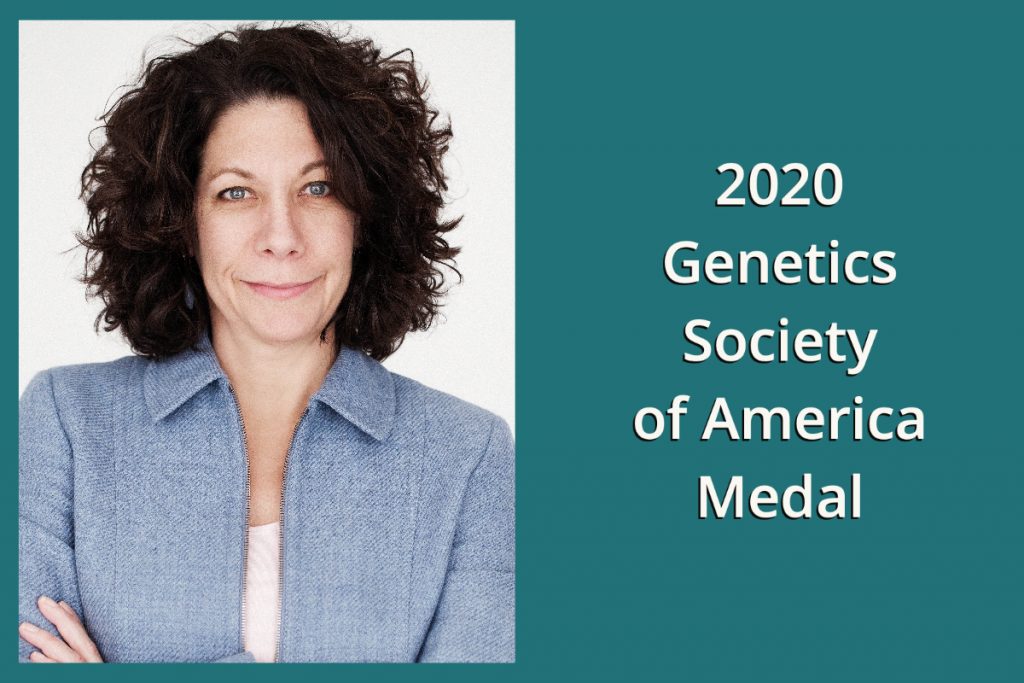
When Bonnie Bassler was wrapping up her biochemistry PhD at Johns Hopkins University, she heard a research talk at a small conference in Baltimore that switched on a light and changed her career. A geneticist described how groups of bioluminescent marine Vibrio bacteria could start glowing simultaneously. “I’m sitting there thinking ‘Holy Smokes, how is it that I have never heard the idea that bacteria can do things together?’” she says. She’d never taken a genetics course, but she ran up to the podium afterwards and begged the speaker, Michael Silverman of the Agouron Institute, for a postdoctoral position. She says, “I worked elbow-to-elbow with him, and that’s how I became a geneticist.”
That decision to pursue genetics and a project that, at the time, was viewed as a quirky effect in a fringe bacterial species led Bassler to reshape how scientists view the microbial world. Following up on the initial work of Woody Hastings and Silverman, Bassler’s team at Princeton University discovered that Vibrio bacteria use multiple chemical signals to communicate. Based on those initial discoveries, Bassler was awarded a MacArthur Fellowship in 2002, and since then her work on communication among a range of bacterial species has been recognized with other notable honors including the Shaw Prize in 2015.
She hasn’t stopped blazing new trails with bacteria. For these achievements, Bassler has been awarded the 2020 Genetics Society of America Medal for outstanding contributions in the field of genetics in the last 15 years. “Bonnie’s work has illustrated how bacteria communicate constantly via small molecules, both within and between species. Her work has enormous implications for understanding biofilms and has potentially great future impact for understanding the human microbiome and how to manipulate it to treat human diseases,” says Ronald Vale of UCSF, one of the scientists who nominated Bassler for the award.
“Bacteria need to understand: am I alone or am I in a group? because they need to behave differently in those two scenarios,” Bassler says. To do this, bacteria make and release chemical signal molecules known as autoinducers. As bacteria reproduce and increase in number, the external autoinducer concentration likewise increases. Detection of accumulated autoinducer alerts bacteria that there are other bacterial cells in the vicinity. “In unison, all the bacteria change their behavior. This process is called quorum sensing and hundreds of bacterial behaviors are involved, including virulence.” Bassler showed that, in addition to conveying information about cell numbers, autoinducers encode information that identify a neighbor as a close relative, as a “cousin” from a related species, or as an unrelated outsider.
Bassler has used a suite of scientific tools to decode the languages that bacteria use to communicate and act collectively. “She always begins her studies with elegant genetic analyses, and then she underpins her mutant phenotypes with biochemistry, structure, chemistry, and biophysics approaches to comprehensively answer fundamental questions about cell-cell communication and bacterial collective behaviors,” says Ned Wingreen of Princeton, who also nominated Bassler for the award.
These research questions drive how Bassler’s team pairs other methods with genetics. Initially, after identifying autoinducer synthase genes, they needed chemistry to decode the molecular “words” comprising the bacterial lexicon, and then structural biology to characterize the receptors bacteria use to detect those molecules. Bassler’s team has also used imaging and microfluidic devices to explore how flow, corners, curves, and eddies affect bacterial quorum sensing in environments that mimic nature. When students and postdocs bring ingenious questions, her job is not to be “too chicken” to adopt new approaches to answer them, Bassler says. She and her team learn new techniques together, and she often works with expert collaborators.
Most recently, Bassler’s team has started exploring more complex questions about how quorum sensing occurs in realistic situations, with mixtures of different bacterial species, viruses, and even eukaryotic cells. For example, her lab has shown that a Vibrio phage can eavesdrop on bacterial quorum sensing. This ability allows the phage to time the killing of its bacterial host to the optimal moment, when host cell numbers are at their peak. This insidious strategy enables the phage to maximize its chances of transmission to the next host cell.
“What I’m most excited about right now is the breadth of organisms participating in quorum-sensing conversations, from viruses to bacteria to eukaryotes,” she says. Other horizons include understanding exactly how bacteria compute blends of autoinducer signals in complex situations. “When all these organisms are making, destroying, hijacking, freeriding, cheating, and eavesdropping on the signal molecules, how does anybody get robust information?” she asks.
Addressing these fundamental scientific questions could shape medicine and human health in several ways. Researchers could develop medicines that interfere with bacterial quorum sensing to halt infections, improve communication between beneficial species in the human microbiome, or perhaps produce new bacterial strains that use quorum sensing to promote health.
Despite the revolution in microbiology over the last 25 years, there’s a still a danger that researchers could underestimate what bacteria can accomplish, Bassler says. “I’m focusing on overarching principles and trying not give these bacteria short shrift.” She has been gratified by the amazing energy and growth surrounding bacterial research. She adds, “I’m proud that this reawakening started with this little glow-in-the-dark guy.”
The Genetics Society of America Medal honors an individual member of the Society for outstanding contributions to the field of genetics in the last 15 years. GSA established the Medal in 1981 to recognize members who exemplify the ingenuity of the GSA membership through elegant and highly meaningful contributions to modern genetics.
Nominations for the 2021 GSA Awards will open in September 2020.













